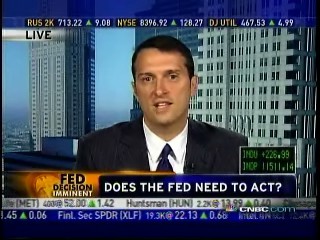USERNAME: apple
PASSWORD: tree
Due to broadcaster copyrights, the website with our video is now required to have a password (it cannot be an “open site”). When you click on the link above, you will be required to enter the username and password given above. You can click on the “save password” check-box in your browser to avoid doing this in the future.
Comment Jim was on CNBC yesterday prior to the Federal Reserve’s announcement.
If you missed the interview, you can watch it by clicking on the picture above. To see any of our recent interviews, click on the open button.
Speaking just before the FOMC meeting, we opined that the Federal Reserve would hold steady but our belief was they should raise rates. Bill Gross was on after the the announcement and said raising rates was a “comical idea.” He likened it to 1931 when the Federal Reserve raised rates and worsened the Great Depression. He said the U.S. economy is already in recession and in the midst of the greatest asset deflation ever seen, so how could the FOMC raise rates? He also called 2.00% a floor and while he saw no more Federal Reserve eases, he did expect other central banks to ease. He does not expect a hike for a long time.
We addressed our belief about the Federal Reserve in a Market Facts last week:
We asked rhetorically in our most recent entry in this series whether the Federal Reserve had a clear policy and some sense of the outcomes likely to result from those policies. The answer is “No” to both questions.
If so – and we challenge anyone to prove us wrong – the prospect of no action is unsettling. For the Federal Reserve to remain “on hold” because no actions are indicated is one thing; for the Federal Reserve to remain on hold because they are lurching from one crisis to the next without a plan and need to satisfy their conflicting mandates is another thing altogether.
They will remain on hold because they fear whatever action they undertake will be wrong. It is quite simply human nature and an observation of behavioral finance mistakes of omission are preferable to mistakes of commission. They are not.
And a recent Commentary:
The Federal Reserve and its sister central banks – and by extension, all of us – are in a highly precarious position. A reasonable observer can look at what has happened in food and energy prices, the exchange value of the dollar and in the massive U.S. incentive to repudiate its debts, both foreign and domestic, via inflation and conclude our greatest threat is hyperinflation.
A second reasonable observer can look at equity indices near decade-ago levels, collapsing housing prices, contracting credit and commercial lending markets and squeezed consumers and conclude economic activity is at risk of imploding. The Federal Reserve and then-Secretary of the Treasury Andrew Mellon looked at all of the cash resulting from the liquidation of assets in 1930 and made what we now know to be the fatal mistake of letting the money supply contract. Deflations often look like bad inflation when they begin.
We only can hope Benjamin Bernanke, who for all of the criticism aimed at him here and elsewhere is nothing if not a foremost student of the Great Depression, can avoid both perils. History does tell us inflations if they are not engineered into hyperinflations are easier to manage than deflationary recessions.


